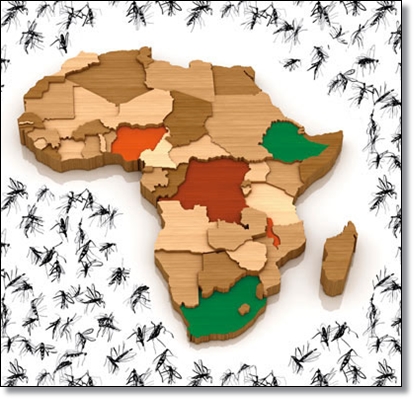Malaria in Africa:The Struggle Continues

 |
The progress in responding to malaria in Africa includes a 54% decline in malaria mortality rates and a reduction of malaria mortality rates among children by 58% since 2000. Increased political commitment and increased funding have helped to reduce malaria incidence by 34% in Africa. In spite of these tremendous results however, Africa continues to account for 82% of malaria cases and 90% of malaria deaths worldwide.
The Abuja 2000 malaria targets and the Millennium Development Goals malaria related targets remain an unfinished business. As the world rethinks and fine-tunes the new framework of sustainable development goals that will supersede the current development goals Africa should remain at the forefront of the thought leadership to fast track its development aspirations.
The review of the Abuja Call this year recommended its extension to 2030 in line with the 2013 Abuja Declaration which outlines key actions to defeat malaria. Africa has already demonstrated this deep reflection and pace setting through the African Common Position on the Post 2015 Development Agenda and the reengineering of Africa’s health priorities in the context of a new health architecture better prepared for disease surveillance and response.
Africa remains the continent most heavily affected by malaria, with particularly severe effects on maternal and child health. While malaria was eradicated from most places on the globe, it remains a major killer on the continent. With the science and medical advancements available to eliminate this disease this is unacceptable. An estimated 80% of the world’s malaria cases and 90% of malaria-related deaths occur in sub- Saharan Africa, and in children aged under 5 years, who account for 78% of all deaths. Children under 5 years and pregnant women are the most vulnerable populations who bear an outsized burden of this disease’s deadly toll.
To address malaria there is need to ensure that sufficient resources are guaranteed to mount an effective response. There were exponential increases in funding and implementation for malaria control programmes over the past decade. International disbursements for malaria control significantly increased, rising from less than US$ 0.5 per case (US$ 100 million total spend) in 2000 to more than US$ 8 per case in 2012 (US$ 1.84 billion total spend). These increased funds were focused on Africa. This investment substantially improved the outlook for Malaria control in Africa. Today more households than ever own at least one insecticide-treated bed net (ITN).
According to the current statistics, over half (US$2.8 billion) of the estimated annual global resource requirement is still unfunded which threatens to slow down progress as high-burden African countries are unable to replace expiring long-lasting insecticide treated nets (LLNs). There is a greater need to ensure that African countries continue to step up efforts for domestic financing for health to ensure sustainability in alignment with the African Union Roadmap for Shared Responsibility and Global Solidarity for AIDS, TB and Malaria Response.
Why do we need a big push to defeat Malaria? We need the big push for two reasons (1) existing funding gaps for malaria which are estimated at approximately US$972 million in 2015 threaten to reverse the gains already achieved in the past decade and (2) malaria causes out-of-pocket expenditure for households and loss of productivity to the economy resulting in massive losses to economic growth, with an estimated cost of US$ 12 billion each year in lost productivity in Africa alone.
The African Union Commission’s strategic plan (2014-2017), 2013 Abuja Declaration, the AU Roadmap and the African Union Common Position on the Post 2015 Development Agenda all provide a solid framework to ensure ownership including increased domestic financing while still taking into account the fundamental importance of development cooperation and global solidarity.
New data suggests that for every US $1 invested in malaria in Africa, an estimated US $40 Gross Domestic Product is generated in return. But recent economic crises have left an estimated annual funding gap of US $1 billion in 2015 in Africa alone. This is a real threat that can unravel the gains made against this preventable and treatable disease. As much of the continent expands at unprecedented rates, enormous leadership and political will continue to play an increasingly critical role through domestic financing as the continent works to overcome pressing health challenges into a more prosperous and sustainable future.
The 2015 continental World Malaria Day will be celebrated under the global theme “Invest in the future: defeat malaria” to emphasise the centrality of continued investment in health systems and community systems. The theme resonates with the Abuja Declarations and AU Roadmap for Shared Responsibility and Global Solidarity to accelerate innovative domestic financing and to ensure sustained and predictable funding.
As much of the continent expands at unprecedented rates, enormous leadership and political will continue to play an increasingly critical role through both international and domestic financing as the continent works to overcome pressing global health challenges, like malaria, and into a more prosperous and sustainable future.
Let me take this opportunity to thank various development partners who continue to support the continental malaria response. These include The Global Fund to Fight AIDS, Tuberculosis and Malaria, USAID, DFID and various UN agencies.
No one can deliver on Africa’s development better than Africa itself. We have what it takes to end Malaria. The time for action is NOW!
By H.E. Dr. Mustapha Sidiki Kaloko
Commissioner for Social Affairs, African Union Commission.
